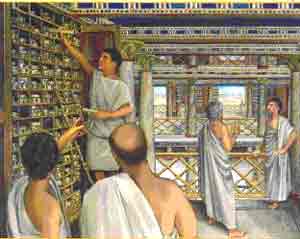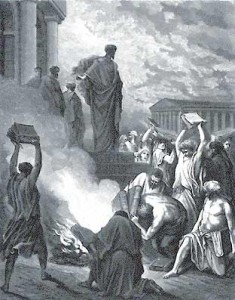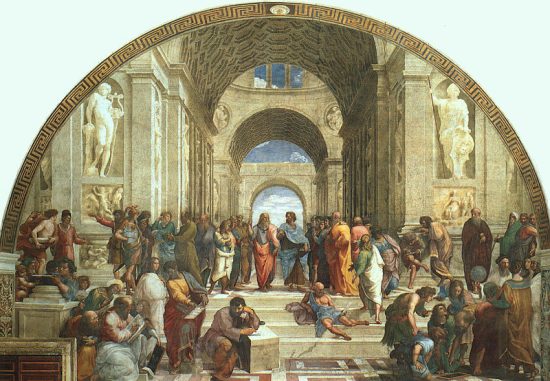Hypatia: Fanaticism Vs. Sacred Knowledge

The Hypatia Effect: Religious Fanaticism versus Sacred Knowledge
Hypatia of Alexandria was born c. 350 AD as a daughter of the famous mathematician Theon Alexandricus (c. 335 – 405 AD). From all the women throughout the history of human civilization, the earliest recorded pioneer that not only represented the feminine intelligence but actively worked towards the benefit of Humanity as a whole was Hypatia of Alexandria. She was an exceptional human being, the owner of both an incredible beauty and towering intellect. She was responsible for the most prominent place in the ancient world for the gathering of culture, knowledge and the philosophical understanding of Human reality: the Library of Alexandria.
The ancient Library of Alexandria, possibly the most famous library in the history of Mankind, was the center of learning and scientific research for the ancient world. Alexandria was a thriving cosmopolitan city and was a major city for trade and commerce because it stood at the crossroads of different cultures. It was not a seat of power, as was Rome or Constantinople, but it was the heart of the ancient world. The Library was not merely a repository for books, although the value of its collection was immeasurable: it was the world’s cultural and intellectual capital, teeming with influential scholars from different backgrounds and cultures for more than seven centuries.
 Within the Library of Alexandria worked a community of philosophers and intellectuals who established and developed the sciences of physics, linguistics, medicine, astronomy, geography, mathematics, biology and geology. Genius flourished in Alexandria, where scholars undertook the first serious attempts to understand the world, both physically and transcendentally.
Within the Library of Alexandria worked a community of philosophers and intellectuals who established and developed the sciences of physics, linguistics, medicine, astronomy, geography, mathematics, biology and geology. Genius flourished in Alexandria, where scholars undertook the first serious attempts to understand the world, both physically and transcendentally.
No complete inventory or record exists documenting the Library’s collection, but it is estimated that it contained at least 700,000 papyrus and vellum scrolls at its zenith. The Library encouraged the translation and interpretation of intellectual property from one civilization to another. It was at the Library that the Old Testament was first translated from Hebrew into Greek.
The loss of the Library represented a huge setback for humanity, since many of the old treatises, not only from the philosophers, scientists, historians and researchers of the time; but the works of the many generations before them were permanently lost forever. All the progressive work done, the registries and history of our world destroyed; and only the imagination of men can estimate the potential of what could have been based on the scraps remaining.
“Was not Hypatia the greatest philosopher of Alexandria, and a true martyr to the old values of learning? She was torn to pieces by a mob of incensed Christians not because she was a woman, but because her learning was so profound, her skills at dialectic so extensive that she reduced all who queried her to embarrassed silence. They could not argue with her, so they murdered her.”
~ Iain Pears, The Dream of Scipio
 Hypatia is well remembered as being the first woman scientist in history. She was presumably born in 370 CE, the daughter of the mathematician Theon, who was at the same time her tutor, her teacher, and her inspiration. Theon was a philosopher, astronomer, mathematician and a professor at the Egyptian University and was also director of Alexandria Museum. Hypatia grew up inside of an inspiring environment of intellectual caliber, where it was taught that a healthy mind could only flourish in a healthy body, “Mens Sana In Corpore Sano”.
Hypatia is well remembered as being the first woman scientist in history. She was presumably born in 370 CE, the daughter of the mathematician Theon, who was at the same time her tutor, her teacher, and her inspiration. Theon was a philosopher, astronomer, mathematician and a professor at the Egyptian University and was also director of Alexandria Museum. Hypatia grew up inside of an inspiring environment of intellectual caliber, where it was taught that a healthy mind could only flourish in a healthy body, “Mens Sana In Corpore Sano”.
Hypatia was famous for her gifts of oration and rhetoric. She was well versed in all the religions of the ancient times, and it is said that one of her books were about a compendium of comparative religion. She completed her education in the Neo-Platonist Academy with Plutarch in Athens and later became the director of Alexandria Academy. In mathematics, she was compared to Ptolemy, Euclid, and Hyparch, and the works of these men were the basis on which all the construction of temples, museums, centers of thought and learning, and art expressions were created from. Her knowledge and wisdom were a reference of reverence and respect, and many politicians consulted her about the issues of the City and State.
The majority of her legacy was lost and never reached our times: they were crudely destroyed when the crowd invaded and looted the Temple of Serapis Bey, the Ancient Library.
Hypatia, despite her astonishing beauty never married and, in her words, she justified this as “already being married with the truth”. She lived in a world of conflict and unrest where the roots of Paganism and the “newborn” Christianity were rivals for the concepts of mind and spirit. In the fanaticism of the new intolerant mentality, Hypatia was considered impure, not only because most of her system of beliefs and teachings were based on the freedom of thought, but she was also the face of Neo-Platonism in the city of Alexandria. Her ideas that the Universe was governed by traceable mathematic laws, and that all men were created equal, no matter what their systems of belief were, were considered “wild.” She was regarded and condemned as a heretic by Cyril, the Bishop of Alexandria.
 On a tragic afternoon one day in 415 CE, during the sacred season of Lent, Cyril roused the faithful attending services, turning them into a riotous mob. They stormed the Library, burning and looting the priceless treasures belonging to all humanity. Hypatia was dragged from the meditation room inside her house. Her clothes were ripped from her, she was raped and violated, and she dragged through the streets of Alexandria to the main church, where she was cruelly and barbarically killed.
On a tragic afternoon one day in 415 CE, during the sacred season of Lent, Cyril roused the faithful attending services, turning them into a riotous mob. They stormed the Library, burning and looting the priceless treasures belonging to all humanity. Hypatia was dragged from the meditation room inside her house. Her clothes were ripped from her, she was raped and violated, and she dragged through the streets of Alexandria to the main church, where she was cruelly and barbarically killed.
Hypatia’s life, her works, teachings and tragic death caused many philosophers, mathematicians, and historians to refer to her with reverence and deep respect when talking about her memory and legacy. Even in the modern age, intellectuals such as Carl Sagan, Bertrand Russel, and Voltaire rendered her the most uplifting compliments and praises.
Her death meant more than just a single human death; it symbolized the end of an era and the entrance of humanity into an age of darkness, where all the symbols, traditions and scientific knowledge of the ancient time were condemned to the fires of ignorance, arrogance, and intolerance. The pillars of the new faith were cemented in place by lust for power and religious fanaticism. The Dark Ages may have dawned in Egypt, but grew to encompass the entire ancient Roman world.
Hypatia’s history and life serve as an icon and a clear representation of what can happen to mankind when the fires of intolerance, blind faith and fear-mongering take over a hysterical and ignorant crowd. Because of this, 1600 years ago, we needed to start our scientific and philosophical bases again from ground zero. It is imperative that we do not let it happen again, for the sake of all Humanity, Earth, and all the sentient beings. We are all One.
"He who influences the thought of his times influences all the times that follow. He has made his impression on eternity."
Hypatia







